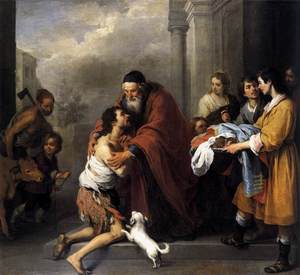Rejoice, Jerusalem, and all who love her. Be joyful, all who were in mourning; exult and be satisfied at her consoling breast.
Laetare Jerusalem: et conventum facite omnes qui diligitis eam: gaudete cum laetitia, qui in tristitia fuistis: ut exsultetis,et satiemini ab uberibus consolationis vestrae.
With the Church we pray
O God, who through your Word reconcile the human race to yourself in a wonderful way, grant, we pray, that with prompt devotion and eager faith the Christian people may hasten toward the solemn celebrations to come.

In the Mass of Paul VI today's gospel, if you don't have catechumens at Mass, is the parable of the Prodigal Son. We know both sons have no clue of who they are persons without the father indicating their moral and human reality. The sons clearly miss the point of their familial sonship. This biblical narrative is heard in the Church as one of the many examples of nature of the Church, especially considering the role of the father. Here we understand the father not only be to biological father of children who need teaching but he stands for the Church who teaches but also reconciles, corrects error but rejoices in a return.
Saint John Chrysostom teaches,
There were two brothers (Luke 15:1-3, 11-32): they divided their father's goods between them and one stayed at home, while the other went away to a foreign country, wasted all he'd been given, and then could not bear the shame of his poverty...The reason the father let him go and did not prevent his departure for a foreign land was that he might learn well by experience what good things are enjoyed by the one who stays at home. For when words would not convince us God often leaves us to learn from the things that happen to us. When the profligate returned...,the father did not remember past injuries but welcomed him with open arms...Are you asking: 'Is this what he gets for his wickedness?' Not for his wickedness, but for his return home; not for sin, but for repentance; not for evil, but for being converted.
Laetare Sunday, the 4th Sunday of Lent is mid-Lent, a time to take a moment to see where our lenten observance has brought us, and where we are headed. The antiphon, noted above, is where is the name of the day taken from, "Rejoice, Jerusalem"; the Mass prayers and music for today were composed for the Stational Mass offered at Santa Croce in Gerusalemme, Rome. The Church knowing that we can make it through 40 days of Lent without a brief break gives us one Sunday to single out the Christian virtue of joy, in a restrained sort of way because it is a rest and not Easter. Laetare Sunday is recognizable because of the rose vestments worn by the clergy at Mass; the day is also called Mothering Sunday, Rose Sunday, Refreshment Sunday, or the Sunday of the Five Loaves.
Where does "Mothering Sunday" and "Sunday of the Five Loaves" come from?
Today is also called Mothering Sunday, a day surely not mentioned in too many places in the USA but again, it's the first reading in the Mass of Blessed John XXIII where we read Galatians 4:22-31; Church hears Saint Paul telling us that not only the Jews, but all others, regardless of their ancestry, --the Church becomes the mother of all people in the Faith with Jesus as the way, the truth and the life; we who come to Jesus Christ in freedom, inherit the patrimony of Abraham. Hence, we know Holy Mother the Church.
Again, if you attend the Mass of the Blessed John XXIII you would hear the gospel of the multiplication of the loaves and the fishes (John 6:1-15), symbols of the Eucharist which we will encounter anew on Holy Thursday. Hence, the Sunday of the Five Loaves.


Leave a comment